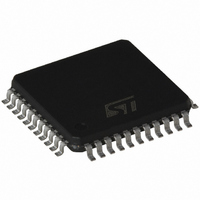ST72C334J4T6 STMicroelectronics, ST72C334J4T6 Datasheet - Page 124

ST72C334J4T6
Manufacturer Part Number
ST72C334J4T6
Description
MCU 8BIT FLASH SPI SCI 44TQFP
Manufacturer
STMicroelectronics
Series
ST7r
Datasheet
1.ST72C124J2T6.pdf
(153 pages)
Specifications of ST72C334J4T6
Core Processor
ST7
Core Size
8-Bit
Speed
16MHz
Connectivity
SCI, SPI
Peripherals
LVD, POR, PWM, WDT
Number Of I /o
32
Program Memory Size
16KB (16K x 8)
Program Memory Type
FLASH
Eeprom Size
256 x 8
Ram Size
512 x 8
Voltage - Supply (vcc/vdd)
3.2 V ~ 5.5 V
Data Converters
A/D 6x8b
Oscillator Type
Internal
Operating Temperature
-40°C ~ 85°C
Package / Case
44-TQFP, 44-VQFP
Processor Series
ST72C3x
Core
ST7
Data Bus Width
8 bit
Data Ram Size
512 B
Interface Type
SCI, SPI
Maximum Clock Frequency
8 MHz
Number Of Programmable I/os
32
Number Of Timers
4 bit
Operating Supply Voltage
3.2 V to 5.5 V
Maximum Operating Temperature
+ 85 C
Mounting Style
SMD/SMT
Development Tools By Supplier
ST7C334-INDART, ST7MDT2-EPB2/US
Minimum Operating Temperature
- 40 C
On-chip Adc
8 bit
Lead Free Status / RoHS Status
Lead free / RoHS Compliant
Other names
497-4838
Available stocks
Company
Part Number
Manufacturer
Quantity
Price
Company:
Part Number:
ST72C334J4T6
Manufacturer:
STMicroelectronics
Quantity:
10 000
ST72334J/N, ST72314J/N, ST72124J
EMC CHARACTERISTICS (Cont’d)
16.7.2 Absolute Electrical Sensitivity
Based on three different tests (ESD, LU and DLU)
using specific measurement methods, the product
is stressed in order to determine its performance in
terms of electrical sensitivity. For more details, re-
fer to the AN1181 ST7 application note.
16.7.2.1 Electro-Static Discharge (ESD)
Electro-Static Discharges (3 positive then 3 nega-
tive pulses separated by 1 second) are applied to
the pins of each sample according to each pin
combination. The sample size depends of the
number of supply pins of the device (3 parts*(n+1)
supply pin). Two models are usually simulated:
Human Body Model and Machine Model. This test
conforms to the JESD22-A114A/A115A standard.
See
Human Body Model Test Sequence
– C
– S1 switches position from generator to R.
– A discharge from C
– S2 must be closed 10 to 100ms after the pulse
Absolute Maximum Ratings
Figure 75. Typical Equivalent ESD Circuits
Notes:
1. Data based on characterization results, not tested in production.
124/153
ator.
to the ST7 occurs.
delivery period to ensure the ST7 is not left in
charge state. S2 must be opened at least 10ms
prior to the delivery of the next pulse.
HIGH VOLTAGE
V
V
GENERATOR
Symbol
ESD(HBM)
ESD(MM)
L
Figure 75
is loaded through S1 by the HV pulse gener-
PULSE
Electro-static discharge voltage
(Human Body Model)
Electro-static discharge voltage
(Machine Model)
and the following test sequences.
S1
L
through R (body resistance)
C
L
100pF
HUMAN BODY MODEL
Ratings
R=1500
ST7
T
T
A
A
S2
+25°C
+25°C
Machine Model Test Sequence
– C
– S1 switches position from generator to ST7.
– A discharge from C
– S2 must be closed 10 to 100ms after the pulse
– R (machine resistance), in series with S2, en-
ator.
delivery period to ensure the ST7 is not left in
charge state. S2 must be opened at least 10ms
prior to the delivery of the next pulse.
sures a slow discharge of the ST7.
HIGH VOLTAGE
GENERATOR
L
is loaded through S1 by the HV pulse gener-
Conditions
PULSE
S1
L
to the ST7 occurs.
C
L
200pF
Maximum value
MACHINE MODEL
ST7
3000
400
1)
Unit
V
S2













